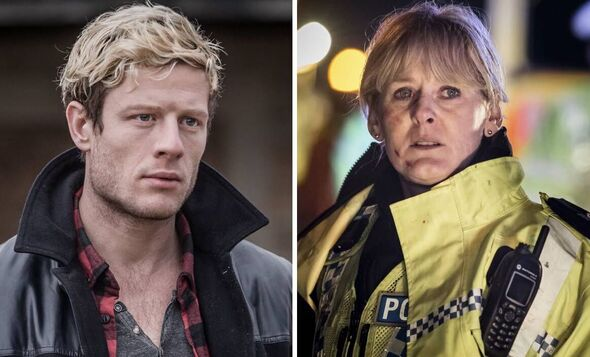I loved the first series of Happy Valley, which I discussed on this blog more than once back in 2014. I enjoyed series two as well, and the third and final series more than matched the high standards set by the first two. There are plenty of good TV cop series around - I have a very soft spot for Endeavour, for instance - but Happy Valley is the best I've seen for many years.
This success is due to a great blend of people, place, and plot. Sally Wainwright's characters are superbly characterised and the story is great. The locations around Hebden Bridge, a town I love visiting, are highly evocative (not far away to the north, by the way, is my imaginary Blackstone Fell!). And the acting is brilliant. Sarah Lancashire wins many deserved plaudits as the tough but very human cop Catherine Cawood. James Norton, an actor with a very impressive range (yes, he would make a great James Bond), is superb as the bad guy Tommy Lee Royce. And Siobhan Finneran is, as usual, terrific as Catherine's dozy but somehow loveable sister. The supporting cast, which includes George Costigan, Amit Shah, Con O'Neill and Vincent Franklin, is consistently excellent.
In some ways the storyline boils down to an intense battle between Good and Evil - Catherine versus Tommy. In the six episodes of this series, we only saw the two of them together in a climactic scene. It was a very good scene, even if one or two lines did remind us a little too forcibly that Sally Wainwright learned her craft writing soap operas. But the important thing that she learned from working on Coronation Street and so on was the art of telling stories about believable people.
And, as I wrote nine years ago, she isn't afraid to give even a vile killer some redeeming qualities. She writes in a powerful but very accessible way - not an easy trick to pull off, but she makes it seem effortless. A remarkable achievement. Even before this series was screened, I mentioned Happy Valley in The Life of Crime as one of the best TV cop shows. After series three, I'm inclined to put it at the very top of the list.

3 comments:
I agree wholeheartedly. I also like the way it is pure Yorkshire, but then, I might be a bit biased. To round off a nail biting and breathless climax: "I think I've singed your crocheted blanket." Strength of character confirmed, action ended, relationship with her sister mended. Cracking stuff!
And far superior to Line Of Duty, thank you. Also must put in a word for the desperately underrated and under reviewed No Offence with the ever reliable and intensely human and relatable Joanna Scanlon.
I thought the ending was very silly. She notices a broken window. That would call for immediate back-up. A trained cop would not enter the house until reinforcements arrive.
So she walks in with stupid taser. A weapon that might not be effective against an armed psychopath.
And then astonishingly she completely fails to de-escalate the situation. in fact she goads him into action. Swears at him, humiliates him. She should be calming him down. Instead she rants on.
A reminder that crime fiction often sinks down to fictitious unrealistic melodrama.
And as soon as you hear there is going to be a court appearance, you know that this will be the opportunity for the prisoner to make his escape. The authorities recognise this vulnerability and add extra precautions. But crime fiction relies on implausibilities and non-logic.
The first series was quite good, but subsequent episodes were weak.
Well, RJS, thanks for commenting but we'll just have to agree to disagree on this - though having a varied range of views is fine. It's very much a matter of opinion and my own view is that Catherine's behaviour was not incredible given what had happened in the past. TV drama departs even more frequently from what would probably happen in real life even more often than prose fiction. But then, many things happen in real life that seem totally unbelievable. I suggest that a key question is whether we buy into the make-believe as a result of the writer's skill. The scale of Tommy Lee Royce's redemption - some of his dialogue and the change that came from looking at the photo album - struck me as over the top and very much the stuff of soap opera. Overall, however, I did buy into it because I felt the writing was effective and the characterisation of Catherine and her family excellent. A TV critic in the Sunday Times suggested it would have been better to have two more episodes to explore all the sub-plots, but I don't agree. For once, it was a pleasure to watch a series that wasn't heavily padded out beyond its natural length.
Post a Comment